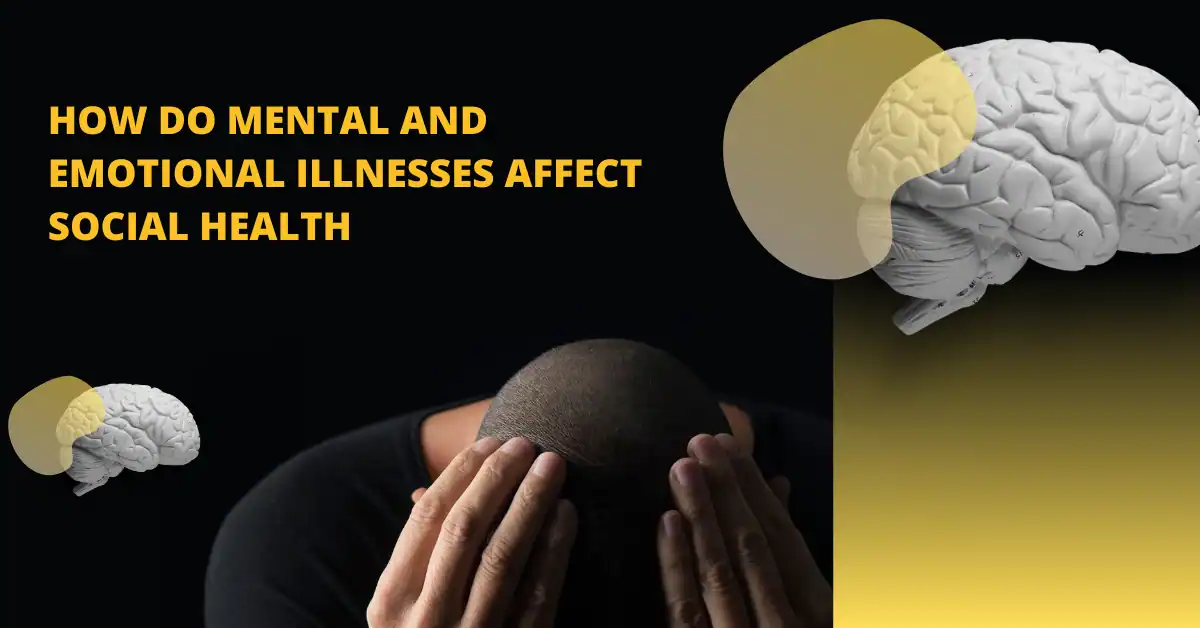In today’s fast-paced world, understanding how mental and emotional illnesses affect social health is essential. Relationships are important for our well-being. However, we often overlook how mental and emotional challenges affect these connections.
Most people know that physical health is important. However, our mental and emotional health is just as vital. It affects how we connect, communicate, and maintain relationships with others.
Mental health issues can make everyday interactions feel overwhelming, while emotional challenges can alter our ability to process and express feelings effectively. Combined, these factors can create barriers to meaningful connections, limiting social health and impacting quality of life. For more ways to improve overall health, you may benefit from focusing on both mind and body wellness.
Table of Contents
ToggleWhat Are Mental and Emotional Illnesses?
Defining Mental Illness
Mental illness encompasses a wide range of mental health conditions that affect thinking, behavior, and mood. Conditions like depression, anxiety, bipolar disorder, and schizophrenia fall within this category, each affecting people in unique ways. Mental illnesses often impact an individual’s ability to handle daily tasks, communicate openly, and sustain relationships.
For example, a person with depression might find it hard to feel motivated. Meanwhile, someone with anxiety may worry about social situations. They often fear being judged or embarrassed.
These conditions make it hard for people to keep their social health. They can also create big challenges in building or keeping connections. For those looking to build healthy social habits, try starting with fitness tips that improve both physical and mental well-being.
Defining Emotional Illness
Emotional illnesses primarily affect how individuals process, respond to, and regulate emotions. Unlike mental illnesses, which may also impact cognition and perception, emotional disorders often involve heightened or suppressed emotional reactions. Common examples include chronic stress, mood swings, or disorders like borderline personality disorder.
Emotional challenges may not always be linked to a diagnosed condition. Sometimes, prolonged periods of stress or unresolved trauma can lead to emotional imbalance, making it hard for individuals to process feelings healthily. This emotional strain can greatly influence how they perceive social interactions, often leading to conflicts or misunderstandings.
The Link Between Mental, Emotional, and Social Health
Mental, emotional, and social health are interconnected, each influencing the others. When a person’s mental or emotional health suffers, it’s common to see a ripple effect on social health. Social health refers to our ability to form relationships, engage in meaningful interactions, and create a support system that nurtures our overall well-being. Taking care of our overall wellness through activities like exercise for posture improvement and mind-body wellness can significantly help.
Mental health challenges can lead to isolation, and emotional health issues can cause misunderstandings, all of which deteriorate social connections. Likewise, poor social health, such as lack of companionship or strained relationships, can negatively impact mental and emotional stability.
Social Health: Why It Matters
Impact of Social Connections on Well-being
Social health plays a crucial role in maintaining overall wellness. Social interactions contribute to our sense of belonging and give us a support network that we can rely on during challenging times. Positive social connections are shown to reduce stress, increase happiness, and even contribute to physical health benefits like lower blood pressure and better immunity.
Mental and Emotional Health as Foundations of Social Health
A stable mental and emotional state is essential for healthy social interactions. When individuals experience mental or emotional turmoil, their ability to connect meaningfully with others can be hindered. This can lead to a cycle where deteriorating social health further exacerbates mental and emotional challenges.
How Mental Illnesses Impact Social Health
Isolation and Withdrawal
One of the most pronounced effects of mental illnesses like depression, anxiety, or PTSD is isolation. People with these conditions may find social interactions exhausting or intimidating, prompting them to avoid or withdraw from social settings. Isolation, however, often amplifies feelings of loneliness and despair, creating a vicious cycle that makes it harder to reconnect.
For instance, a person with severe anxiety might avoid gatherings out of fear of being judged or embarrassed. Similarly, someone with depression may lack the motivation to socialize, even with close friends, which can strain those relationships over time.
Difficulty in Communication
Mental illnesses often make communication challenging. Those with conditions like social anxiety or schizophrenia may struggle to articulate their thoughts or fears, while others may feel misunderstood. Communication issues can lead to awkwardness or frustration in social settings, further discouraging people from seeking connections.
For example, a person with social anxiety might find it hard to speak up in conversations, fearing they’ll be judged or say the wrong thing. This lack of confidence can create barriers in forming or sustaining relationships, affecting their overall social health.
Stigma and Discrimination
Despite progress in mental health awareness, stigma and discrimination remain significant barriers for many. People with mental illnesses are sometimes unfairly judged, leading to isolation and discouragement from engaging in social activities. This stigma can prevent them from building new connections, further impacting their social health.
Society’s misconceptions about mental health often create additional emotional strain for those affected, making it even harder to manage relationships. As a result, the fear of being judged or discriminated against can hold individuals back from pursuing supportive friendships.
How Emotional Illnesses Affect Relationships
Heightened Sensitivity and Misunderstandings
Emotional illnesses often lead to heightened sensitivity, where individuals may feel easily hurt or misunderstood. Small conflicts or disagreements may trigger intense emotional responses, causing friction in relationships. Misunderstandings can escalate quickly, making it difficult to maintain close connections.
For example, someone dealing with emotional challenges might interpret a casual comment as criticism, leading to hurt feelings or withdrawal. This sensitivity can strain friendships and partnerships, as others may feel uncertain about how to approach or communicate effectively.
Emotional Imbalance and Trust Issues
Emotional illnesses can contribute to trust issues in relationships. People with emotional imbalances may experience mood swings or find it challenging to process emotions, leading to doubts about others’ intentions. This can create instability in relationships, as trust is a foundational component of any healthy connection.
Without trust, relationships become fragile, often resulting in misunderstandings or conflicts. Emotional instability may cause individuals to question others’ intentions, leading to frequent misunderstandings or unnecessary conflicts that impact social health.
The Role of Social Health in Recovery and Coping
Support Systems as Essential for Healing
Social health is a cornerstone in the recovery process for individuals dealing with mental and emotional illnesses. A supportive network of family, friends, or community members provides encouragement, understanding, and empathy. This support can make an enormous difference, helping people feel less alone and more hopeful.
Having a strong support system encourages positive coping mechanisms and helps individuals stay accountable to their well-being goals. For many, family and friends become pillars of strength, helping them navigate through their mental health journeys.
Importance of Community in Mental Wellness
Being part of a community provides individuals with a sense of belonging, which is vital for mental wellness. Engaging in community activities, whether through local events, online support groups, or hobby groups, creates a network of acceptance and companionship that can be immensely comforting.
Even small interactions with friends, neighbors, or colleagues contribute to a sense of community, alleviating feelings of loneliness. This sense of belonging fosters mental resilience, encouraging individuals to keep working toward a healthier emotional state.
Practical Tips to Improve Social Health for Those with Mental or Emotional Illnesses
Seeking Therapy and Support Groups
Therapists and support groups offer safe, non-judgmental spaces for people to share experiences and seek advice. These spaces allow individuals to explore their feelings openly, learning coping mechanisms to manage relationships better. Group therapy, in particular, can foster social bonds, enhancing social health.
Practicing Open Communication
Being transparent and honest about feelings, even when it’s difficult, is key to improving relationships. Open communication helps others understand personal boundaries, fostering respect and empathy. This approach strengthens social bonds, even during challenging times.
Building Healthy Boundaries
Establishing and respecting boundaries is crucial for individuals dealing with mental or emotional health challenges. Healthy boundaries protect mental well-being and help others understand limitations, making interactions less stressful and more enjoyable.
Conclusion
In summary, mental and emotional illnesses significantly impact social health, affecting how we interact, connect, and maintain relationships. Recognizing and addressing these effects can improve social well-being, aiding mental health recovery. Despite the obstacles, fostering and nurturing supportive relationships enables individuals to live fulfilling, balanced lives.
FAQs
How can I support a friend struggling with mental illness?
Listening, being patient, and encouraging professional help are essential ways to support someone with mental illness. Small gestures of kindness can make a significant impact.
Does social health contribute to mental recovery?
Absolutely. Positive social health, supported by friends and family, is crucial in providing emotional strength and encouraging recovery.
What simple steps can improve social health?
Engaging in group activities, practicing open communication, and joining support groups can significantly improve social health.
Is isolation common among people with emotional illnesses?
Yes. Emotional illnesses often lead to isolation, as individuals may struggle with social interactions, impacting their social well-being.
How do I maintain friendships while managing mental illness?
Open communication, setting boundaries, and letting friends know when support is needed are essential steps in maintaining friendships. True friends will understand and offer support.






